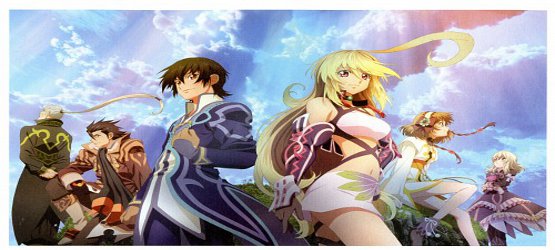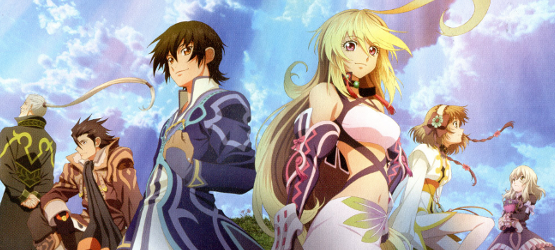
The Tales of series has been delighting RPG lovers and everyone else since way back in 1995 when it first released for the SNES. Fast forward 18 years and the series is still going strong with the release of Tales of Xillia for the PlayStation 3. Namco Bandai is eager to keep the good times rolling with this release, but with any lengthy series there can sometimes be bumps in the road. Is this one of those bumps or can we add this to the ever growing list of good Tales of games?
Tales of Xillia gives you a fairly different take to its story as, at the very start, you are able to select whether you want to play as either Jude Mathias or Milla Maxwell. Jude is a medical student attending school, while Milla is a mysterious girl with a lot on her plate. No matter who you choose, it’s the same story, albeit told from a different viewpoint. It isn’t enough incentive to replay the game just to see it from each angle, and it is by no means as great as the multiple takes from each character in Suikoden III. However, it is always nice to have the option of choosing the main character and it helps that both characters stand out and tell the same story.
Our heroes are out to stop the Kingdom of Rashugal from initiating an all out war, but they won’t do it alone – they are joined by a wide array of characters, from a childhood friend of Jude’s, to a mercenary named Alvin. This story is told through in-game cutscenes and storyboard portraits, which, like previous Tales games, gives the story and characters a lot of depth. The little mini-storyboards that pop up during your travels are especially memorable, giving you a ton of good laughs as well as insight into each character’s thoughts. My only gripe, and it is minor, is that it would have been nice to see a bit more in the way of full on cinematic cutscenes.
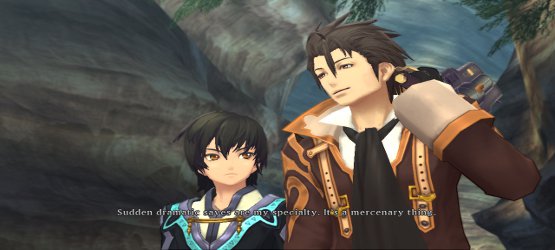
Characters are a major component in Xillia. Milla is a strong female character who is unrelenting in her task, but also sympathetic towards others as the story grows. Jude might fall into the mold of angst-riddled teenager for some, but his character really develops as the game progresses, much like Luke fon Fabre did in Tales of the Abyss. Adding to this, all of the side characters you meet and play as bring something worthy to the table, though with the translation to English, there are definitely more than a few annoying voices in the cast, but they aren’t as clamorous as other RPGs that have come stateside.
Aside from being swept into the story, the majority of your time will be spent in combat, which luckily is extremely solid. Veterans of the series should feel right at home here and newcomers will find it easy to pick up and enjoy right from the get go. Battles take place in a circular arena with yourself and three AI-controlled teammates attacking whoever crosses your path. Offense consists of four regular attacks or with four artes that you can assign to a character. The combination of the two is extremely effective during battle and, when mastered, can be chained together to do some serious damage. Where Xillia really differs from its predecessors is with the Double Raid Linear Motion Battle System (whew!), but let’s just call it linking. What this system allows you to do is link with one of your AI teammates and pull off powerful combo attacks or have your linked partner guard you from a rear attack. What makes it even better is that your two other AI teammates will actually link together and do the same. Each teammate’s link ability is different, adding some depth to the strategy—meaning you can link with Leia and she will steal items from downed enemies, or with Elize and she will provide me TP points so you can continue to use even more artes.
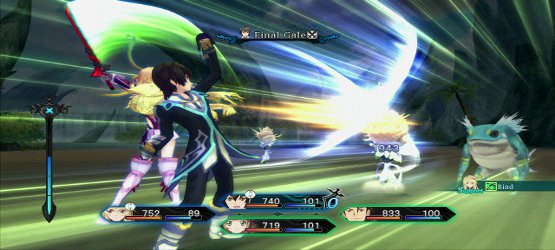
Unfortunately, the combat suffers due to its light difficulty. Exacerbating this issue is the fact that each area you explore has far too many enemies populating it—so while the battles are overly easy, you will have to fight through 10-15 of them before you can even get to the next area, giving it a layer of tedium that’s hard to shake. The game can be such a grind going from one story scene to the next. However, despite the light difficulty, boss fights are unusually frustrating, forcing you to grind even more to be at the appropriate level to take one down. Even with these negatives, the combat can still be very enjoyable and fun.
Gaining levels in the game is a real treat though, as you don’t gain stat boosts when you level up, you instead earn GP to use. With these points, you can upgrade your characters via the spider web-looking Lilium Orb. Each character’s web is pretty much the same, minus a few differences in nodes. You may choose to bolster strength or intelligence, depending on which character you are working on. However, as you get deeper into the game, you will notice that each web basically ends up nearly identical to the others and therefore it defeats the illusion of true character customization.
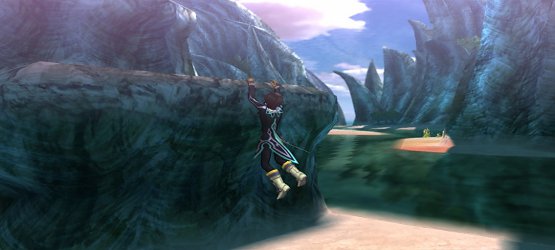
Exploration plays a part in the game as well, though most of that is entirely up to the individual player. There are quests in nearly every town given to you by its inhabitants. These are your typical RPG-type quests, so get ready to take care of bandits or find someone a type of food they really want to eat. Thankfully, the game allows you to quick travel to any location you have already visited, so you can complete these quests at your leisure. Fast travel comes even more in handy when it comes to weapons, armor, and items stores. As you gather items throughout your travels, you can donate them to the store of your choice, upgrading that store and the items it carries. This aspect alone is the main reason to accept quests, though it still isn’t necessary to complete your playthrough.
Environments are frequently reused. There were four or more sea ports that were basically replicas of each other, down to the shops being in the exact same location. It comes off rather lazy when compared to the rest of the towns in the game that were given their own style and beauty. Otherwise, the environments are all beautiful, providing a perfect backdrop of color and flair to the story. Strangely, even though the game’s musical score was excellent, it had me often humming the original Power Rangers theme during battles (I swear, go listen to it again and it sounds extremely similar!).
Tales of Xillia is another stellar game in this long standing series. It doesn’t reinvent the wheel or blow anyone over with some amazing new tech, but the Tales series has never been about that. What the game does do is bring together a compelling story full of interesting characters, vibrant worlds, and a combat system that is fun and fluid. The team behind the game didn’t just recycle the same old game, as the linking system adds a new and interesting dimension to the already phenomenal combat system. If you do enjoy a solid JRPG, or you are especially fond of this series, this is a game you should add to your collection. As an avid JRPG and Tales fan myself, I would even venture to say Xillia ranks right up there with my favorites, Tales of Symphonia and Tales of the Abyss. Take that for what it’s worth.
-
Linking system got me 'linked' in and excited
-
Compelling story and characters
-
Combat, while a tad easy, is still a blast
-
Visually appealing worlds
-
English voices don't suck!
-
No excuse for reusing town skins more than once
-
Some minor slowdown in gameplay
-
Too many enemies make commute times lengthy
-
Combat not overly challenging
